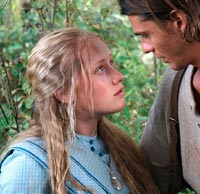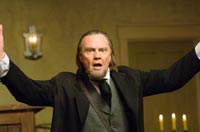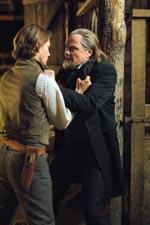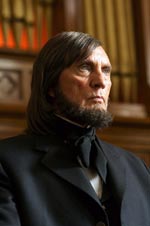There is no historical event so grand, so tragic, so complex that it cannot be reduced to a love story. From the American Civil War to the sinking of the Titanic, the images that dominate our memory of the past have often come from the utterly fictitious movies that use these events as epic backdrops for sweeping romances.
So when Daryl F. Zanuck, the founder of 20th Century Fox, produced Brigham Young in 1940, he knew it was not enough to lay out the historical facts, even in a highly mythic form. His film was designed to cast the early Mormon leader in the best, most heroic light possible, but the title role went to a lesser actor named Dean Jagger (who, incidentally, went on to convert to Mormonism some years later). The star of the film was matinee idol Tyrone Power, who played a young Mormon lad who falls in love with a Christian girl as the Mormon pioneers make their historic trek to Utah.
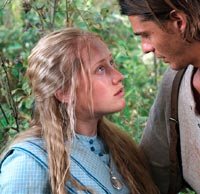
Writer-director Christopher Cain has the exact opposite agenda in September Dawn, but he follows a similar narrative logic. The film concerns the Mountain Meadows Massacre, in which over 100 men, women and children, passing through Utah in a wagon train in 1857, were slaughtered by Mormons and their Indian allies—the largest mass murder of Americans by other Americans until the Oklahoma City bombing in 1995. And the main lens through which we witness this atrocity is a tale of forbidden love between a young Mormon man and a young Christian woman.
This might not be so bad if the love story itself were the point of the movie. The two young lovers, Jonathan Samuelson (Trent Ford) and Emily Hudson (Tamara Hope), first notice each other when he accompanies his father (Jon Voight), the local Mormon bishop, on a visit to the wagon train. The pioneers have just arrived from Arkansas and Missouri, and are on their way to California, but they need a place to stop and rest for a while—and the bishop grants it, seemingly happily.
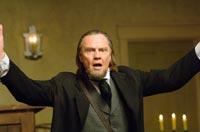
But privately, among his fellow Mormons, the bishop expresses hatred and contempt for the migrating settlers. The film offers a sliver of justification for his feelings, as the Mormons were persecuted in Missouri years before they came to Utah—but the flashbacks quickly indicate that the Mormons may have earned the wrath of their neighbors by proclaiming Joseph Smith (Dean Cain) a “second Mohammed,” taking up arms, and trashing the office of a newspaper that was critical of them.
Jonathan, who was just a boy when all those things happened, doesn’t seem to care much about all that. Despite his father’s stern prayers condemning the outsiders, Jonathan spends a lot of his time down by the wagon train, taming a horse and winning Emily’s affections. (Unlike his father and brothers, all of whom have multiple wives, Jonathan has none, because he is “picky”—the sign of a true romantic.)
Ford and Hope are not exactly the best actors around, but they are both quite good at communicating their characters’ desire, however sublimated, for each other; this is that rare movie that finds chaste eroticism in something as innocent as a bare shoulder in the moonlight. William Ross’s lovely score certainly helps, too.
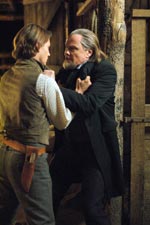
However, unlike some period-piece romances, the love story isn’t really what this movie is about. September Dawn was made primarily as a history lesson, to bring to light an atrocity that took place 150 years ago, and to underscore the parallels between the religious fanaticism of the past and the religious fanaticism of the present. (Believe it or not, the massacre took place on September 11.)
And here’s where things get a bit dodgy. The film clearly pins responsibility for the massacre onto Brigham Young (Terence Stamp), the head of the Mormon church and the Governor of Utah at that time; but historians, like the ones interviewed in the powerful documentary Burying the Past, say it is unclear whether Young was directly involved. If the film was assuming his responsibility for dramatic purposes, and using it to explore an even larger theme, that would be one thing; but instead, Young’s alleged responsibility is itself the point that the film wants to hammer home.
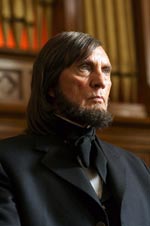
Don’t expect the Mormon church, which has always denied Young’s complicity in the massacre, to change its tune because of this film, though. At nearly every point, September Dawn paints the early Mormons as fanatical brainwashed zealots, and the wild, unstable camera angles that cinematographer Juan Ruiz-Anchia uses when Young or Voight’s bishop speak to their followers only drive the point further home. There may indeed be some basis for this characterization—the sermons Young gives, in which he exhorts his followers to slit throats and shed blood, are reportedly historical—but it’s not exactly the sort of thing that will encourage dialogue.
What makes this portrayal even more questionable is the stark contrast the movie draws between the Mormons and the settlers. An introductory voice-over tells us that the massacre took place when “two different worlds met . . . one of love, one of hate,” and the film never leaves us in any doubt as to which is which. The Mormons are closed-minded and spiteful, but the settlers are so open-minded that Emily’s father, a preacher, doesn’t bat an eye when she says she wants to marry Jonathan. Shouldn’t he be just a little concerned about that whole “unequally yoked” thing?
To its credit, September Dawn does not secularize the settlers, but allows them to be the Christians—cultural or otherwise—that they presumably were. So when Emily finds aspects of Jonathan’s life puzzling, the dialogue that emerges between them is a dialogue between two religious points of view. How much sense this will make to the modern secular moviegoer is anyone’s guess, but it’s good to know that the filmmakers didn’t go too far out of their way to make the story “accessible.” Those who want to know what really happened, though, are advised to look elsewhere.
Talk About It
Discussion starters- Have you ever fallen in love with someone from another religious group? How did you handle the experience? How would you advise someone else in that situation?
- What do you make of this film’s portrayal of the early Mormons? Did you think it should be more “balanced”? Did it seem accurate enough to you? How would you have responded to this film if you were a Mormon? What if the film had been pretty much the same, but had been about atrocities committed by Christians?
- What do you make of this film’s portrayal of the Christian settlers? Did they seem naïve? Reasonable enough? What would you have done in their position?
- Why do you think people were (and are) attracted to Mormonism? Note the scene where Bishop Samuelson says Joseph Smith picked him up off the street, and now he has it in himself to become a god. How is this similar to, or different from, Christian forms of evangelization?
- Have you ever felt persecuted? How hard has it been to love your enemies? What has happened when you have done so? Why do you think Jesus tells us to do this?
- What do you do when people claim to have heard specific messages from God? Is there a way of telling which messages are really from him? If so, what is it?
The Family Corner
For parents to considerSeptember Dawn is rated R for violence, including numerous gunshot wounds, a body floating in the river, and various other forms of murder. Also, a man’s testicles are nailed to a wall, and a man is briefly seen from behind when he is baptized in the nude. (The baptism in the film is a Mormon ceremony, but Christians were baptized in the nude in the early church, too, to identify with Christ’s nakedness on the cross and with Adam’s innocence in the Garden of Eden.)
Photos © Copyright Black Diamond Pictures
Copyright © 2007 Christianity Today. Click for reprint information.

